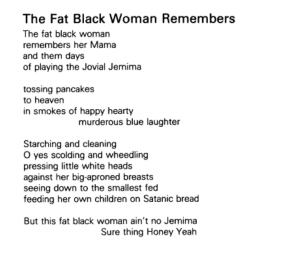 While the majority of the members of the Fat Underground were white and most of the information found on the Fat Liberation movement is centered on white women, this does not mean the movement was exclusive. Fat women of color also struggled to find their voice in mainstream second wave feminism. They too used poetry as liberation.
While the majority of the members of the Fat Underground were white and most of the information found on the Fat Liberation movement is centered on white women, this does not mean the movement was exclusive. Fat women of color also struggled to find their voice in mainstream second wave feminism. They too used poetry as liberation.
In her 1984 book “The Fat Black Woman’s Poems,” Guyanese-born poet Grace Nichols presents the fat black woman’s body as an object of divinity despite the demonization and fetishization of black bodies. The poem, “The Fat Black Woman Remembers,” is from this poetry anthology and calls upon a stereotype of fat black women: the Aunt Jemima. The image of Aunt Jemima is a caricature that is based in the mammy archetype used in minstrel shows during and after American slavery. Nichols acknowledges the origin of the Jemima stereotype when mentioning that “the Jovial Jemima” pressed “little white heads/ against her big aproned breasts” alluding to the childcare services of a fat female slave due to her assumed matronliness (lines 4, 11-12). This legacy of slavery and oppression shapes the way black women were viewed based on their weight in a way that does not affect women of other races and Nichols uses her poetry to illuminate this fact.
Source: Nichols, Grace. “From ‘The Fat Black Woman’s Poems’.” Ambit, no. 97, 1984, pp. 2–6. JSTOR, JSTOR, www.jstor.org/stable/44339778.
